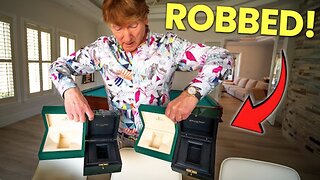Premium Only Content

Episode 477: St. Peter Nolasco
Founder
(1189-1256)
In the early thirteenth century the Moors still held much of Spain, and in sudden raids from the sea they carried off thousands of Christians, holding them as slaves in Granada and in their citadels along the African coast. A hero of these unfortunates was Saint Peter Nolasco, born about the year 1189 near Carcassonne in France. When he went to Barcelona to escape the heresy then rampant in southern France, he consecrated the fortune he had inherited to the redemption of the captives taken on the seas by the Saracens. He was obsessed with the thought of their suffering, and desired to sell his own person to deliver his brethren and take their chains upon himself. God made it known to him how agreeable that desire was to Him.
Because of these large sums of money he expended, Peter became penniless. He was without resources and powerless, when the Blessed Virgin appeared to him and said to him: "Find for Me other men like yourself, an army of brave, generous, unselfish men, and send them into the lands where the children of the Faith are suffering." Peter went at once to Saint Raymond of Pennafort, his confessor, who had had a similar revelation and used his influence with King James I of Aragon and with Berengarius, Archbishop of Barcelona, to obtain approbation and support for the new community. On August 10, 1218, Peter and two companions were received as the first members of the Order of Our Lady of Ransom, dedicated to the recovery of Christian captives. To the three traditional vows of religion, its members joined a fourth, that of delivering their own persons to the overlords, if necessary, to ransom Christians.
The Order spread rapidly. Peter and his comrades traveled throughout Christian Spain, recruiting new members and collecting funds to purchase the captives. Then they began negotiations with the slave-owners. They penetrated Andalusia, crossed the sea to Tunis and Morocco, and brought home cargo after cargo of Christians. Although Peter, as General of the Order, was occupied with its organization and administration, he made two trips to Africa where, besides liberating captives, he converted many Moors. He died after a long illness on Christmas night of 1256; he was canonized by Pope Urban VIII in 1628. His Order continues its religious services, now devoted to preaching and hospital service.
-
 26:40
26:40
Producer Michael
8 hours agoI WAS ROBBED IN MY NEW HOUSE!
9.59K1 -
 13:00
13:00
SKAP ATTACK
4 hours ago $0.26 earnedMichael Malone FIRED by Nuggets
4.7K1 -
 1:11:45
1:11:45
NucleoNick
1 day ago🟢LIVE NOW! The Legend of Zelda: Skyward Sword - Part 8🟢
2.62K -

Slightly Offensive
2 hours ago $4.25 earnedShould THEY Be Able to Use SELF-CHECKOUT? | Guest: Hermes
17.5K3 -
 LIVE
LIVE
Adam Does Movies
10 hours ago $1.01 earnedLet's Talk Movies! Ask Me Anything - LIVE!
288 watching -
 LIVE
LIVE
AlaskanBallistics
11 hours ago $0.24 earnedI love this Gun PodCast #25
36 watching -
 LIVE
LIVE
Anthony Rogers
6 days agoEpisode 360 - Document Leaks
46 watching -
 6:48:42
6:48:42
Spartan (Pro Halo esports Player)
7 hours agoPro Halo Player
8.37K -
 LIVE
LIVE
HELMETFIRE
1 hour ago🟢METAL EDEN - NEW SCI FI FPS!🟢RUMBLE TAKEOVER🟢
19 watching -
 58:28
58:28
BonginoReport
5 hours agoUKRAINE Tied To Trump Assassination Attempt? - Nightly Scroll with Hayley (Ep. 22) 04/08/2025
97K108